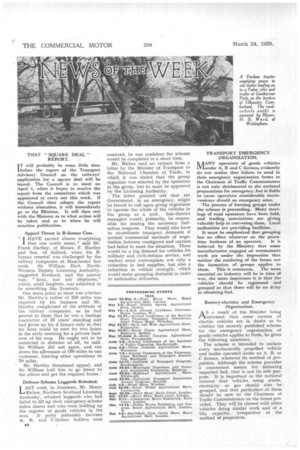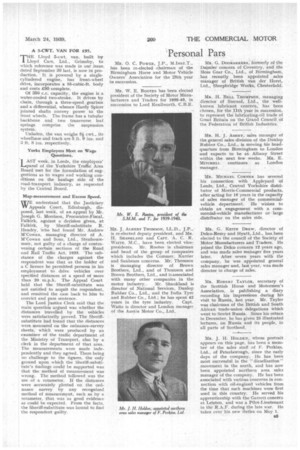THAT "SQUARE DEAL" REPORT.
Page 30

Page 31

If you've noticed an error in this article please click here to report it so we can fix it.
IT will probably be some little time /before the report of the Transport Advisory Council on the railways' application for a square deal will be issued. The Council is to meet on April' 4, when it hopes to receive the report from the committee which was appointed to carry out this work. If the Council then adopts the report without alteration, it will immediately go to the Minister. It will then rest with the Minister as to what action will be taken and as to when he will sanction publication.
Appeal Threat in B-licence Case.
" T
HAVE carried almost everything
1 that one could name," said Mr. Frank Hartley, of Messrs. F. Hartley and Son, of Salford, when his Blicence renewal was challenged by the railway companies at Manchester last week. Sir William Hart, NorthWestern Deputy Licensing Authority, suggested livestock, and the answer was, "lions, but not elephants." which, amid laughter, was admitted to be something like livestock.
One main, point at issue was whether Mr. Hartley's radius of 150 miles was required by his business and Mr. Hartley complained of the attitude of the railway companies, as he had proved to them that he was a haulage contractor of 35 years' standing and had given up his A licence only so that his lorry could be used for two hours in the early morning for a private business of his own. He ought not to be restricted in distance at all, he said. Sir William did not agree, and cut down the allowance of 150 miles to one customer, limiting other operations to 70 miles.
Mr. Hartley threatened appeal, and Sir .William told him to go direct to the offices and get the required forms.
Defence Scheme Laggards Rebuked.
LAST week, in Aberdeen, Mr. Henry Riches, Northern Scotland Licensing Authority, rebuked laggards who had failed to fill up their emergency-scheme index sheets and who were holding up the register of goods vehicles in the area If petty jealousies between A, B, and icence holders were
84
removed, he was confident the scheme would be completed in a short time.
Mr. Riches read an extract from a letter by the Minister of Transport to the National Chamber of Trade, in which it was stated that the group organizer was selected by the operators in the group, but he must be approved by the Licensing Authority.
The letter pointed out that the Government, in an emergency, might be forced to call upon group organizers to operate the whole of the vehicles in the group as a unit. Sub-district managers would, primarily, be responsible for issuing the necessary fuelration coupons. They would also have to co-ordinate transport demands if normal commercial methods of negotiation between consignors and carriers had failed to meet the situation. There would be a big demand for vehicles for military and civil-defence service, and traders must contemplate not only a reduction in fuel supplies, but also a reduction in vehicle strength, which would make grouping desirable in order to nationalize deliveries. TRANSPORT EMERGENCY ORGANIZATION.
AANY operators of goods vehicles alunder A, B and C licences evidently do not realize that failure to send in their emergency organization forms to the Chairmen of Traffic Commissioners is not only detrimental to the national preparations for etnergency, but is liable to cause operators considerable inconvenience should an emergency arise.
The process of forming groups under the scheme is proceeding. Many meetings of road operators have been held, and trading associations are giving valuable help in convening them. Local authorities are providing facilities.
It must be emphasized that grouping has no effect whatever on the peace
time business of an operator. It is believed by the Ministry that some manufacturers engaged on rearmament work are under the impression that neither the rendering of the forms nor the formation of groups applies to them. This is erroneous. The more essential an industry will be in time of war, the more important it is that the vehicles should be registered and grouped so that there will be no &lay in obtaining fuel.
Battery-electrics and Emergency Organization.
AS a result of the Minister being informed that some owners of electric vehicles are in doubt as to whether the recently published scheme for -the emergency organization of goods vehicles applies to them, he gives the following assurance.
The scheme is intended to include every mechanically propelled vehicle and trailer operated under an A, B, or C licence, whatever its method of propulsion. Although the scheme provides a convenient means for rationing imported fuel, that is not its sole purpose. It is important in the national interest that vehicles using steam, electricity or gas should also • be grouped, and that particulars of them should be sent to the Chairmen of Traffic Commissioners on the forms provided. They will be classed with other vehicles doing similar work and of a like capacity, irrespective of the method of propulsion.
A 5-CWT. VAN FOR £95.
THE Lloyd 5-cwt. van, built by Lloyd Cars, Ltd., Grimsby, to which reference was made in our issue dated September 30 last, is now in production. • It is powered by a singlecylindered engine, has front-wheel drive, incorporates a 55-cubic-ft. body and costs £95 complete.
Of 350 c.c. capacity, the engine is a water-cooled two-stroke. It drives by chain, through a three-speed gearbox and a differential, whence Hardy Spicer jointed shafts convey power to the front wheels. The frame has a tubular backbone and two transverse leaf springs comprise the suspension system.
Unladen, the van weighs 8i cwt., its wheelbase and track are 5 ft. 9 ins. and .1.; ft. S ins. respectively.
Yorks Employers Meet on Wage Questions.
LAST week, in Leeds, the employers' panel of the Yorkshire Traffic Area Board met for the formulation of suggestions as to wages and working conditions on the haulage side of the road-transport industry, as requested by the Central Board.
Map-measurement and Excess Speed.
WE understand that the Justiciary Appeals Court, Edinburgh, disposed, last week, of an appeal by Mr. Joseph G. Morrison, Procurator-Fiscal, Falkirk, against a derision given, at Falkirk, by Sheriff-substitute R. Hendry, who had found Mr. Andrew M'Cowan, managing director of A. M'Cowan and Sons, Ltd., Stenhousemuir, not guilty of a charge of contravening certain sections of the Road and Rail Traffic Act, 1933. The substance of the charges against the respondent was that as the holder of a C licence he permitted persons in his employment to drive vehicles over specified distances at a speed of snore than 20 m.p.h. The Appeal Court held that the Sheriff-substitute was not entitled to acquit the respondent, and remitted the case back to him to convict and pass sentence.
The Lord Justice Clerk said that the main question argued was whether the distances travelled by thea vehicles were satisfactorily proved. The Sheriffsubstitute had found that the distances were measured on the ordnance-survey sheets, which were produced by an examiner of the traffic department of the Ministry of Transport, also by a clerk in the department of that area. The measurements were made independently and they agreed. There being no challenge to the figures, the only ground upon which the Sheriff-substitute's findings could be supported was that the method of measurement was wrong. The method followed was the use of a rotanneter. If the distances were accurately plotted on the ordnance survey by any recognized method of measurement, such as by a rotameter, that was as good evidence as could be expected. From the facts, the Sheriff-substitute was bound to find the respondent guilty.




















































































